A prosthetic limb can be life-changing for seniors, offering renewed mobility, independence, and the ability to engage in daily activities with confidence. However, choosing the right prosthetic for older adults requires a thoughtful approach that prioritizes comfort, safety, and ease of use. Seniors face unique challenges, from adapting to physical changes to navigating everyday environments, and their prosthetics must address these needs effectively.
This guide explores how prosthetic limbs can improve the quality of life for seniors while ensuring that their specific requirements are met. From understanding the importance of proper fit to designing for safety and accessibility, we’ll examine the factors that make a prosthetic limb truly beneficial for older adults.
Understanding the Unique Needs of Seniors
The physical and emotional needs of seniors differ from those of younger prosthetic users. Aging often brings changes such as reduced muscle strength, lower bone density, and a slower healing process, all of which can impact the choice and use of a prosthetic limb.
The Role of Comfort in Daily Use
Comfort is paramount for seniors who wear prosthetic limbs. Discomfort or improper fit can lead to irritation, pressure sores, and even a reluctance to use the prosthetic altogether.
Older adults often spend extended periods using their prosthetic, whether walking around the house, running errands, or socializing with loved ones.
For businesses, designing prosthetics with soft, hypoallergenic liners and lightweight materials can significantly enhance comfort for senior users.
Offering a range of socket designs, including adjustable or custom-fitted options, ensures that each prosthetic adapts perfectly to the individual’s anatomy and activity level.
Prioritizing Safety
Safety is a top concern for seniors, especially those who may already be at risk for falls or injuries. A prosthetic limb that provides stability and balance is essential for preventing accidents.
Features like anti-slip soles, multi-axial ankles, and secure suspension systems can reduce the likelihood of falls while navigating uneven terrain or stairs.
Businesses can emphasize these safety features during consultations, educating users and caregivers on how they enhance confidence and reduce risks. Providing demonstrations or trials allows seniors to experience the benefits firsthand, reinforcing their trust in the product.
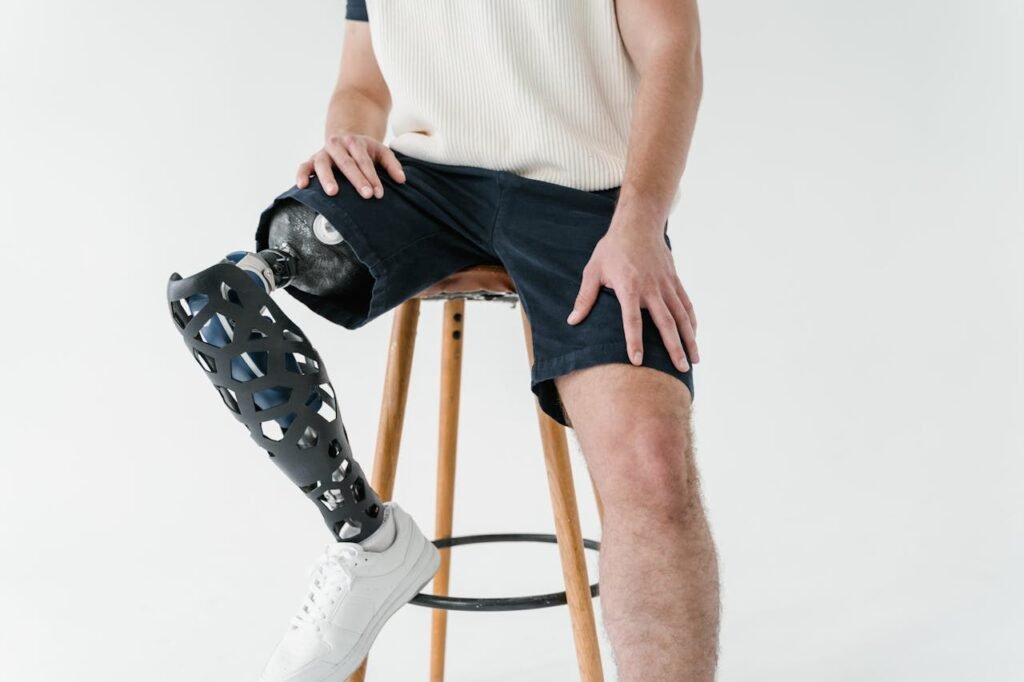
Designing Prosthetics for Accessibility
Accessibility is about more than physical design—it’s about creating solutions that fit seamlessly into a senior’s life. Prosthetic limbs should be easy to use, maintain, and adjust, ensuring that older adults can handle them independently or with minimal assistance.
Simplifying Prosthetic Use
Seniors often prefer prosthetics that are straightforward to put on, take off, and operate. Complicated mechanisms or features that require frequent adjustments can be frustrating and discourage consistent use.
Businesses can address this by designing user-friendly interfaces, such as quick-release mechanisms or intuitive locking systems. For instance, an upper-limb prosthetic with simple, manual grip controls may be more accessible for seniors than a high-tech myoelectric model with intricate settings.
Providing clear, step-by-step instructions—whether through printed guides, videos, or in-person training—helps seniors and their caregivers feel confident in using the prosthetic. Businesses that prioritize accessibility in both design and communication create a more inclusive experience for their users.
Usability as the Cornerstone of Accessibility
For seniors, prosthetic usability is often defined by simplicity. Complex mechanisms or high-tech features can overwhelm users who may prefer straightforward, intuitive designs. This does not mean compromising on innovation but rather ensuring that the technology is user-friendly and serves a clear purpose.
Prosthetics for seniors should be designed with features that require minimal effort to operate. For example, self-aligning sockets or auto-locking systems can simplify the attachment process, reducing physical strain and the need for caregiver assistance.
Upper-limb prosthetics with ergonomic controls ensure that seniors with reduced hand strength or dexterity can still perform essential tasks without difficulty.
Prioritizing Maintenance-Free Solutions
Maintenance can be a barrier to accessibility, especially for seniors who may not have the physical ability or technical knowledge to perform regular upkeep. Designing prosthetics that are as low-maintenance as possible ensures uninterrupted use and reduces the burden on users.
For instance, incorporating self-lubricating joints, dirt-resistant materials, and simple cleaning routines into the design can significantly improve accessibility. Seniors are more likely to use their prosthetics consistently if the devices require little effort to keep in optimal condition.
Businesses that offer annual maintenance plans or in-home servicing options provide an added layer of convenience, building trust and fostering long-term relationships with their senior clientele.
Addressing Affordability Without Compromising Quality
Accessibility is also about ensuring that prosthetics are financially attainable for seniors. Many older adults are on fixed incomes and may find the cost of advanced prosthetics prohibitive. However, affordability doesn’t have to come at the expense of quality or functionality.
Strategically, businesses can explore modular designs that allow users to start with a basic model and upgrade components over time. This approach offers flexibility while spreading out costs, making advanced features more accessible.
Additionally, partnering with non-profit organizations, government programs, or insurance providers can help subsidize costs for seniors in need.
Adapting Prosthetic Features to Senior Lifestyles
Seniors often lead diverse and active lifestyles, engaging in activities that range from light exercise to hobbies, travel, and social gatherings. Prosthetic limbs must cater to these varied routines while accommodating the physical changes associated with aging.
Customizing Mobility Solutions
Mobility is a cornerstone of independence for seniors. Whether walking through a park, climbing stairs at home, or navigating uneven terrain, a prosthetic limb that enhances movement while maintaining stability is essential.
For lower-limb prosthetics, features like shock absorption and energy-efficient foot designs can reduce the strain on joints and muscles, making walking or standing less tiring. Multi-axial ankles that adapt to different surfaces improve balance and confidence, particularly for seniors who may be less agile.
Upper-limb prosthetics for seniors should focus on simplicity and ease of control. Lightweight materials and ergonomic designs reduce fatigue, while adjustable grip strength ensures usability for tasks like holding utensils or gardening tools.
Businesses that offer modular components, allowing seniors to tailor their prosthetics to specific activities, demonstrate a deep understanding of their diverse needs.
Enhancing Comfort for Prolonged Use
Seniors may wear their prosthetics for extended periods, making comfort a critical consideration. The socket, which connects the prosthetic to the residual limb, must be precisely fitted to prevent discomfort, chafing, or pressure sores.
Advanced liners made from breathable, hypoallergenic materials are ideal for seniors, especially those with sensitive skin. Adjustable sockets that accommodate changes in limb volume—common among older adults—help maintain a secure and comfortable fit over time.
For businesses, investing in technologies like 3D scanning ensures a customized fit that minimizes discomfort and enhances user satisfaction. Providing follow-up adjustments and routine check-ins helps address any issues proactively, reinforcing the importance of long-term care.
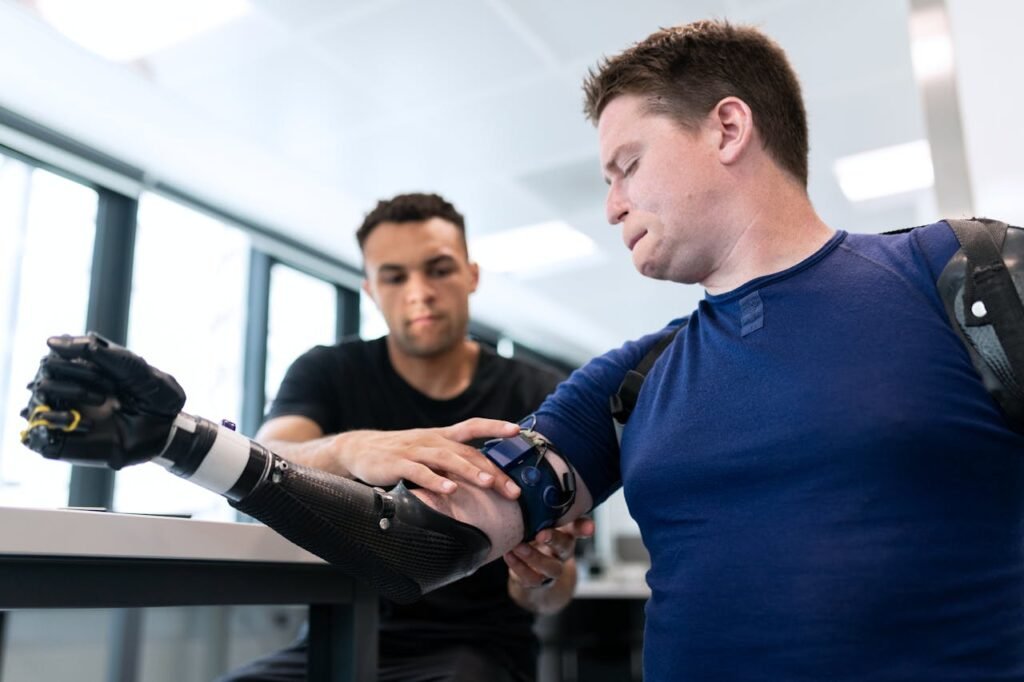
Addressing Emotional and Psychological Needs
Adapting to a prosthetic limb is not just a physical journey—it’s an emotional one. For seniors, the transition can bring mixed feelings, including excitement about regaining independence and apprehension about learning to use the device. Businesses that recognize and address these emotional aspects can make the process more supportive and empowering.
Building Confidence
Confidence is essential for seniors adapting to a prosthetic limb. Encouragement, patience, and clear guidance help users overcome initial hesitations and develop a positive outlook on their new mobility.
For businesses, offering personalized training programs led by compassionate professionals can make a significant difference. Demonstrating how the prosthetic improves daily life—whether by showcasing simple tasks like walking or celebrating milestones such as returning to hobbies—reinforces the user’s sense of achievement.
Highlighting testimonials or success stories from other senior users can also inspire confidence. Seeing peers who have successfully adapted to a prosthetic limb creates a sense of possibility and motivation, fostering a positive mindset.
Fostering Community and Connection
Seniors often benefit from connecting with others who share similar experiences. Peer support groups, online forums, or local meetups provide valuable opportunities to exchange tips, share challenges, and celebrate progress.
Businesses can facilitate these connections by creating or sponsoring community initiatives. For example, hosting events or workshops that bring senior prosthetic users together fosters a sense of belonging and camaraderie.
Highlighting these efforts in marketing materials or outreach campaigns demonstrates a commitment to holistic user support.
Long-Term Care and Maintenance for Seniors
Prosthetic limbs for seniors must not only meet immediate needs but also provide lasting reliability. Regular maintenance, proactive care, and accessible support are crucial for ensuring the prosthetic remains functional and comfortable over time.
Ensuring Durability and Longevity
For seniors, a prosthetic limb should be built to withstand the wear and tear of daily use. This includes using materials that are lightweight yet durable, such as carbon fiber composites or reinforced polymers. However, durability must also balance with flexibility and comfort, especially for users who may have reduced strength or dexterity.
Businesses can support longevity by offering products with a proven track record of durability and providing detailed care instructions.
For instance, simple routines like cleaning the socket regularly, checking for loose components, and lubricating mechanical parts can extend the life of the prosthetic and ensure consistent performance.
Providing warranties or maintenance packages tailored to senior users adds value, giving them peace of mind that their prosthetic is a reliable, long-term investment. For added convenience, businesses might offer at-home repair services or quick-access clinics to minimize disruptions to daily routines.
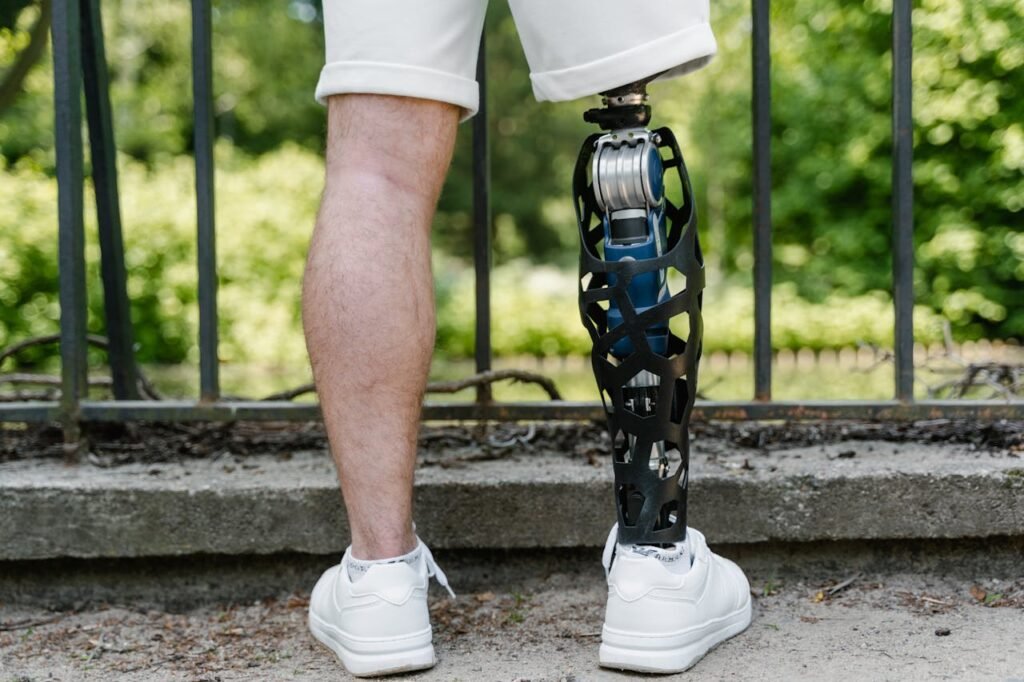
Accommodating Physical Changes Over Time
As seniors age, their physical condition may change, affecting the fit and functionality of their prosthetic. For example, fluctuations in weight or muscle tone can impact the snugness of the socket, while joint stiffness may influence the user’s ability to operate certain mechanisms.
Prosthetics designed for seniors should incorporate adjustable features, such as sockets that can be resized or components that adapt to changing gait patterns. Regular follow-up appointments with a prosthetist are essential for making these adjustments and addressing any discomfort.
Businesses can enhance this process by offering subscription-based care plans that include periodic assessments and minor modifications. This proactive approach ensures that the prosthetic continues to meet the user’s needs, even as those needs evolve.
Simplifying Repairs and Replacements
For seniors, the prospect of repairing or replacing a prosthetic limb can be daunting. Complicated processes or extended downtime may lead to frustration and reduced mobility. Businesses must prioritize simplicity and speed in their repair and replacement services to minimize inconvenience.
For example, offering loaner prosthetics while repairs are underway ensures that users can maintain their independence without interruption. Establishing clear communication channels, such as dedicated support lines or online portals, helps seniors and their caregivers navigate the process with ease.
Technology and Innovation: Meeting the Needs of Seniors
Advancements in prosthetic technology are opening new possibilities for senior users, enhancing comfort, safety, and functionality. From smart sensors to lightweight materials, these innovations are reshaping the prosthetic experience for older adults.
Smart Features for Enhanced Usability
Smart prosthetics equipped with sensors and microprocessors can significantly improve the user experience for seniors. These technologies enable the prosthetic to adjust automatically to changing conditions, such as shifting terrain or speed.
For example, a lower-limb prosthetic with a microprocessor knee can detect uneven ground and provide real-time stability adjustments, reducing the risk of falls. Upper-limb prosthetics with sensory feedback can help users gauge grip strength, making tasks like holding delicate objects more intuitive.
Businesses that invest in developing or offering these smart features can position themselves as leaders in senior-friendly innovation. Providing training on how to use these advanced capabilities ensures that users feel confident and supported as they adapt.
Lightweight and Energy-Efficient Designs
For seniors, reducing physical strain is critical. Lightweight prosthetics made from materials like titanium or advanced polymers minimize fatigue, making extended use more comfortable.
Similarly, energy-efficient designs that mimic natural movement patterns help conserve energy, allowing seniors to stay active for longer periods.
Businesses can emphasize these benefits during consultations, demonstrating how their products address common challenges faced by older adults. Highlighting user testimonials or case studies further illustrates the transformative impact of these designs.
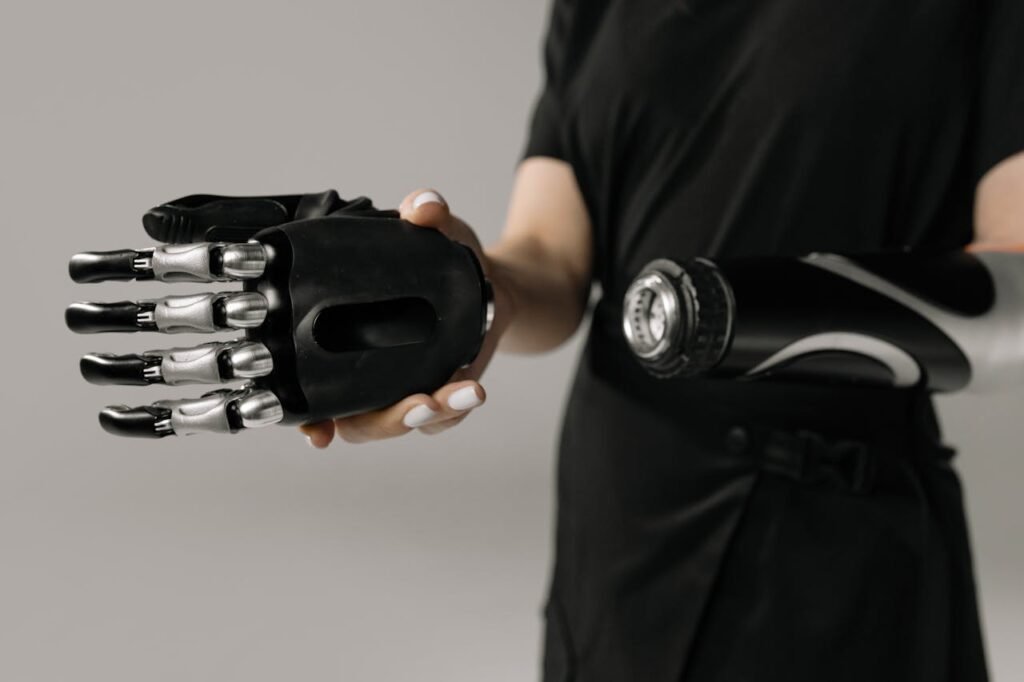
Building Trust and Accessibility in the Prosthetic Journey
For seniors, choosing and adapting to a prosthetic limb is a deeply personal journey that requires trust, empathy, and clear communication. Businesses that prioritize accessibility and user-centric care can foster lasting relationships with their senior clientele.
Creating a Seamless Experience
From the initial consultation to follow-up care, every interaction should be designed to meet the needs of seniors and their caregivers. This includes clear explanations of product options, transparent pricing, and personalized recommendations based on the user’s lifestyle and goals.
For example, offering home consultations or virtual fittings can make the process more convenient for seniors with mobility challenges. Providing access to multilingual materials or caregiver-focused guides ensures that all stakeholders are informed and empowered.
Building Long-Term Relationships
Prosthetic care is an ongoing partnership, and businesses that invest in building relationships with their users can create loyalty and trust. Regular check-ins, user feedback initiatives, and community events demonstrate a commitment to supporting seniors beyond the initial purchase.
Highlighting these efforts through marketing campaigns or testimonials reinforces the brand’s dedication to improving lives. By prioritizing user satisfaction and long-term engagement, businesses can establish themselves as trusted leaders in the prosthetics industry.
Emphasizing Community Support and Awareness
Prosthetic limbs are more than medical devices—they are gateways to independence and participation. For seniors, feeling connected to a community and having access to support networks can greatly enhance their overall experience with prosthetics. Businesses that recognize the value of fostering such connections can elevate their role in the prosthetic journey.
Establishing Peer Support Networks
Seniors often find encouragement and motivation by connecting with peers who share similar experiences. Peer support networks provide an opportunity to exchange practical tips, share personal stories, and celebrate milestones together.
Businesses can play a role in facilitating these networks by organizing local meetups, workshops, or online forums tailored to senior users. For example, an event focused on “Adapting Prosthetics to Daily Life” could include demonstrations, Q&A sessions with experts, and user success stories.
These gatherings not only build community but also reinforce the business’s commitment to empowering its customers.

Educating Caregivers and Families
For many seniors, caregivers and family members are integral to their prosthetic journey. Educating these individuals on the proper use, maintenance, and support of prosthetic limbs ensures a smoother transition and day-to-day experience.
Businesses can offer caregiver training sessions or provide resources such as instructional videos or brochures. These materials might cover topics like helping with adjustments, recognizing signs of discomfort, or assisting with mobility exercises.
By including caregivers in the conversation, businesses create a holistic support system that benefits everyone involved.
Raising Awareness Through Advocacy
Advocacy is a powerful tool for promoting the importance of prosthetic accessibility, particularly for seniors. Businesses can contribute to this effort by partnering with organizations focused on senior health and mobility or by participating in public awareness campaigns.
For example, a company might sponsor a mobility-focused event during National Senior Health Week, showcasing how prosthetics can transform lives.
Collaborating with healthcare providers, rehabilitation centers, or senior living communities further strengthens these initiatives, reaching a broader audience and positioning the business as a leader in senior prosthetic care.
Looking to the Future: Innovations for Senior Prosthetics
The future of prosthetic technology is bright, with new advancements continuously emerging to address the evolving needs of users. For seniors, these innovations hold the promise of even greater comfort, safety, and functionality. Businesses that remain at the forefront of these developments can provide transformative solutions that redefine what is possible.
Integrating Artificial Intelligence
Artificial intelligence (AI) is playing an increasingly prominent role in prosthetic development. AI-powered prosthetics can learn from a user’s movement patterns, adapting in real time to improve efficiency and ease of use.
For seniors, this means devices that can anticipate their needs, such as adjusting stride length, grip strength, or balance based on activity.
For businesses, investing in AI-driven prosthetic solutions ensures that products remain cutting-edge and appealing to a tech-savvy audience.
Offering personalized demonstrations of these capabilities helps seniors and their caregivers understand the practical benefits of adopting advanced technology.
Expanding Telehealth and Remote Support
Telehealth has become an essential tool for delivering prosthetic care, especially for seniors with limited mobility or access to clinics.
Virtual consultations, remote fitting adjustments, and online troubleshooting services provide convenience and flexibility, ensuring that seniors receive the care they need without unnecessary travel.
Businesses can enhance these services by developing user-friendly digital platforms that facilitate communication between users and prosthetists. These platforms could include features such as video call scheduling, progress tracking, or direct messaging for quick support.
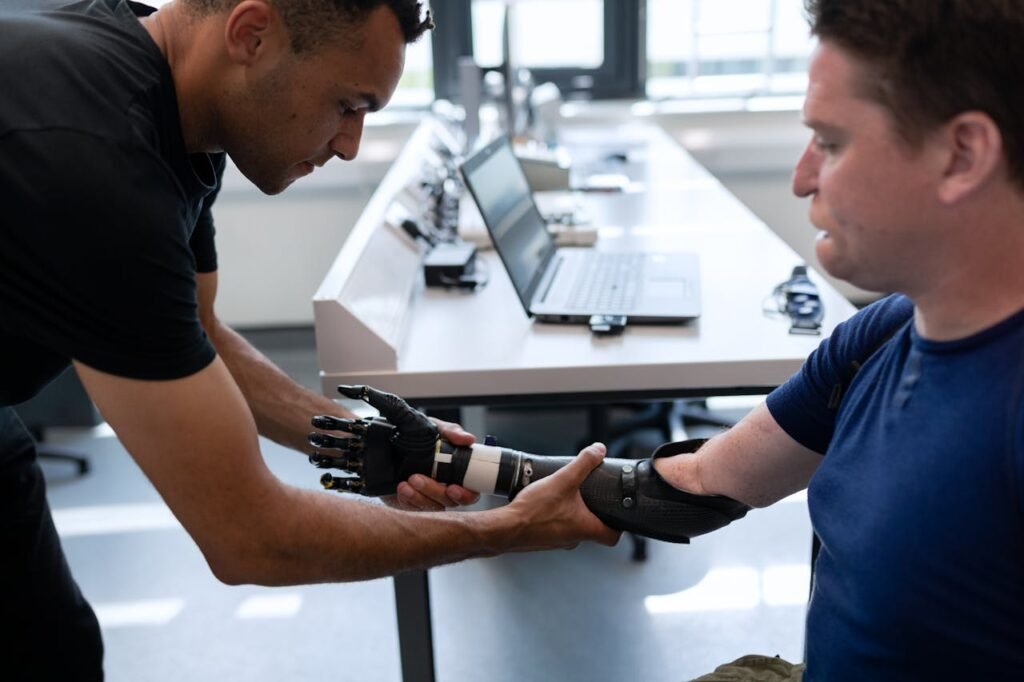
Prioritizing Sustainability
As sustainability becomes a global priority, prosthetic manufacturers have an opportunity to innovate with environmentally friendly materials and processes.
Recyclable components, biodegradable liners, or carbon-neutral production methods can reduce the ecological footprint of prosthetic devices.
For seniors, these sustainable options demonstrate a commitment to creating products that align with their values and contribute to a healthier planet. Highlighting these efforts in marketing campaigns or product descriptions can resonate with environmentally conscious users and caregivers.
Conclusion
Prosthetic limbs for seniors are more than just tools—they are enablers of independence, connection, and quality of life. From initial selection to long-term care, the journey with a prosthetic limb requires thoughtful design, empathetic support, and a commitment to innovation.
For seniors, the right prosthetic can transform daily routines, empower participation in beloved activities, and foster a sense of confidence and self-reliance. For businesses, serving this community is both a responsibility and an opportunity to make a meaningful impact.
By prioritizing comfort, safety, and accessibility, and by staying at the forefront of technological advancements, businesses can ensure that their prosthetic solutions truly meet the needs of senior users. In doing so, they build lasting partnerships that enhance lives, inspire trust, and redefine what it means to age with dignity and mobility.



